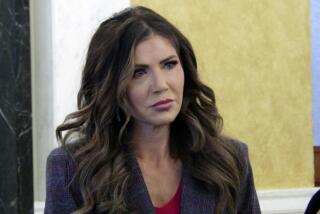In Politics, the Mustache Is the Kiss of Death
- Share via
It’s time to acknowledge the truth behind the virtual disappearance of Jesse Jackson since the Democratic convention. Notwithstanding excuses about his “ultra-liberalism” and inexperience in elected office, Jackson has been shunned by Democratic power-brokers for one reason and one reason only: the mustache.
“The shaved face has become a reflection of the Protestant ethic,” says Roger Masters, a professor of government at Dartmouth College. “Politicians are supposed to control nature in some sense, so beards and mustaches, which imply a reluctance to control nature, are now reserved for artisans or academics.”
Indeed, Jackson is the only contender of recent memory to have both a hairy lip and a successful national career. That a Democrat should do so is ironic, for it was the country’s first Republican presidential candidate, John C. Fremont, from the rough new state of California, who broke the beard-barrier in 1856.
It remained for the next election to spawn our patron saint of facial hair. Grace Bedell, a savvy 11-year-old adviser to Abraham Lincoln, provided the seminal inspiration: “All the ladies like whiskers and they would tease their husbands to vote for you and then you would be President.” Even so, Lincoln wisely waited until after the election to sprout his growth.
In the wake of Lincoln’s assassination, things got out of hand. Martyrdom of the Whiskered One emboldened such fuzzy-faced extremists as War Secretary Edwin Stanton, who nearly engineered the ouster of Vice President Andrew Johnson as Lincoln’s successor. Johnson’s clean cheeks had helped balance the 1864 ticket, and his sympathy for strop and razor brought down the wrath of the newly empowered Hispiditionists.
The subsequent election of Ulysses Grant ushered in a veritable one-party state. Seven chief executives in a row bore facial hair. And the first smooth-skinner to emerge, William McKinley, was gunned down by an anarchist (read: long-hair), which opened the door to the mustachioed Teddy Roosevelt.
Now, unfortunately, the pendulum has swung as far the other way. With the advent of the safety razor and the departure of William Howard Taft, power has come to be projected through an altered symbolism of personal hygiene. Since 1912, the Oval Office has not been gained by anyone bearing so much as mutton chop, goatee or fu man chu. And it’s been 40 years since the either party has even nominated a facially hirsute candidate.
Harry Truman’s stunning 1948 defeat of Thomas Dewey has been attributed by more than one analyst to the Republican nominee’s resemblance to film idol Clark Gable. Which is typical: We’re perfectly willing to be entertained by the well-whiskered--but God forbid they should ever govern. Indeed, the last candidate to brave so little as a 5 o’clock shadow, Richard Nixon, was shaved to pieces by a popular press that was unabashedly tonsorial.
“Today, facial hair is identified with the counter-culture,” says Masters. “You might see a yuppie with a mustache, but rarely at the highest level of business.”
What’s more, the bias cuts across ideological and party lines. Jackson might have been undercut, but so, too, was Supreme Court nominee Robert Bork; he would have been the first beard-bearing justice since Charles Evans Hughes.
All in all, it’s a sad commentary on the a zeitgeist that our nation shows so little tolerance to those of the hair-faced persuasion. Californians, of course, have shown visionary accommodation in their choice of representatives to Washington. Today in the House, Ron Dellums and Henry Waxman keep alive the stylish spirit of former Sen. Fremont.
So there’s hope. We shall overgrow.
More to Read
Get the L.A. Times Politics newsletter
Deeply reported insights into legislation, politics and policy from Sacramento, Washington and beyond. In your inbox three times per week.
You may occasionally receive promotional content from the Los Angeles Times.










